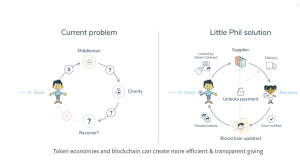While Americans are donating to charities in record amounts, over $410 billion in 2017, fewer overall are giving, according to a 2018 report by Giving USA. Moreover, the share of US GDP that overall amount represents, has not really changed in decades. Some other notable stats:
- Individuals gave nearly $287 billion, accounting for 70% of all giving.
- 84% of Millennials, 25% of US population today, gave to charity, donating an annual average of $481 across 3 organizations.
- $127 billion, 31% of all donations, went to religious organizations.
- $109 billion, about 26% of all donations, went to education and health oriented charities.
Why This Matters
The declining number of Americans who are giving is curious despite economic growth, the stock market boom and a large number of hurricanes, earthquakes and other natural disasters amplified digitally through social media.

Some lament concerns that the new tax law may further reduce the number of people who get a tax break on the money they give away, and advocate for new programs like Flexible Giving Accounts or FGAs.
Personalization of the donation experience could also help, as the wonderful work of one of my cohorts at UPenn’s Executive CSIS program, Ian Yamey of Donational, is aiming to do.
Certainly there could be investments made to make donations more transparent, if the growth of impact investing, really a form of philanthropic innovation, to a $9+ trillion market is any evidence of that.
Transparency Through Blockchain Three example ventures that are aiming squarely at this problem, and there are many more ventures being announced each quarter, include Alice, PromiseGiving and Little Phil Coin. Alice uses smart contracts to implement a “pay for success” donation model, where donors only pay if the charitable projects they give to achieve their goals. Donors give to projects on the Alice platform using fiat currency, and the payment logic is implemented on the Ethereum blockchain using stablecoin tokens pegged to the value of their gifts, and which are held in escrow until validation processes confirm that expected goals were achieved. If the charity does not achieve any goals, outstanding tokens are unlocked and returned to donors. The London-based startup, in a pilot, has raised over £13,000 with the charity St Mungo’s in an appeal called Street Impact: 15 Lives, which is helping 15 homeless people – and for whom traditional approaches and efforts to help them into housing have so far not worked – to put their lives back together. PromiseGiving, formerly GiftCoin, plans to use smart contracts that are embedded in their blockchain to ensure that donations are correctly tracked and applied. Each charitable project will have milestones that must be met before the supply chain of funds and goods can progress whether those are say, digging a well in a drought-stricken region or supporting the arts in a specific country. PromiseGiving is also testing a wallet type of app that allows its users to round up the cost of a purchase and send that small amount to Giftcoin and then on to a chosen charity. Pilots in the U.S. are being run in collaboration with Network For Good, and pilots in the UK are being run in collaboration with Charity Checkout. Little Phil Coin (LPC), this post’s featured image, is creating a token based economic system that rewards donation content creators based on reactions obtained from donors. When a Little Phil Coin receiver, for example, sends an expression of gratitude to a giver, with say a photo with the donated goods, the photo provides feelings of a better connection than a text message saying “Thank you” on its own, providing higher chances of receiving reward tokens. Donors will also be able to upvote content whether they donate to that receiver or not. Upvotes reward the content creator with an amount of LPC after reaching certain milestones. LPC is betting that content and rich media will enhance the donor experience and tokens will help keep quality standards high. To test their ideas, LPC announced in October that Thailand-based Rescue Mission for Children will be one of the first beta charities to be featured on the Little Phil platform. The Rescue Mission for Children aids in the social advancement and economic development of the Akha Hill tribe group and their children in the northern and rural part of Thailand. Alice, PromiseGiving and Little Phil coin are just three examples of small teams who are using blockchain technology to reimagine giving. Executed right, donors in the future will be able to better connect emotionally with causes that resonate with them, and see more transparently where their money is serving, ultimately increasing the overall experience, while serving a social good. Read More Wojciechowski, Jakub. Alice Whitepaper on Github. https://github.com/alice-si/whitepaper Howard, Bichara and Beddoes, GiftCoin Whitepaper. (PDF). https://www.promisegiving.com/GiftCoin_Whitepaper.pdf Murchie, Josh, How a Token System Can Increase Trust and Decrease Costs, Medium, October 2018. https://medium.com/littlephilnews/how-can-a-token-ecosystem-increase-trust-and-decrease-costs-for-charitable-giving-little-phil-29eb9c4c67b4 Murchie, Josh, Announcing Beta Charity Partner – Rescue Mission, Medium, October 2018. https://medium.com/littlephilnews/announcing-beta-charity-partner-rescue-mission-f8cdb6a39f71 Shattuck, Finding Best In-class Investing Talent, Impact Alpha, October 2018. https://impactalpha.com/what-best-in-class-impact-investing-talent-looks-like/ DQR, New Ways to Create Transparency with Charitable Donations, DQR, September 2018. https://www.dqr-group.com/insights/news-room/new-ways-to-create-transparency-with-charitable-donations/ Osili and Zarins, Fewer Americans are Giving to Charity, The Conversation, July 2018. https://theconversation.com/fewer-americans-are-giving-money-to-charity-but-total-donations-are-at-record-levels-anyway-98291 Yamey, Ian, Donational FAQ. https://donational.org/faq 










